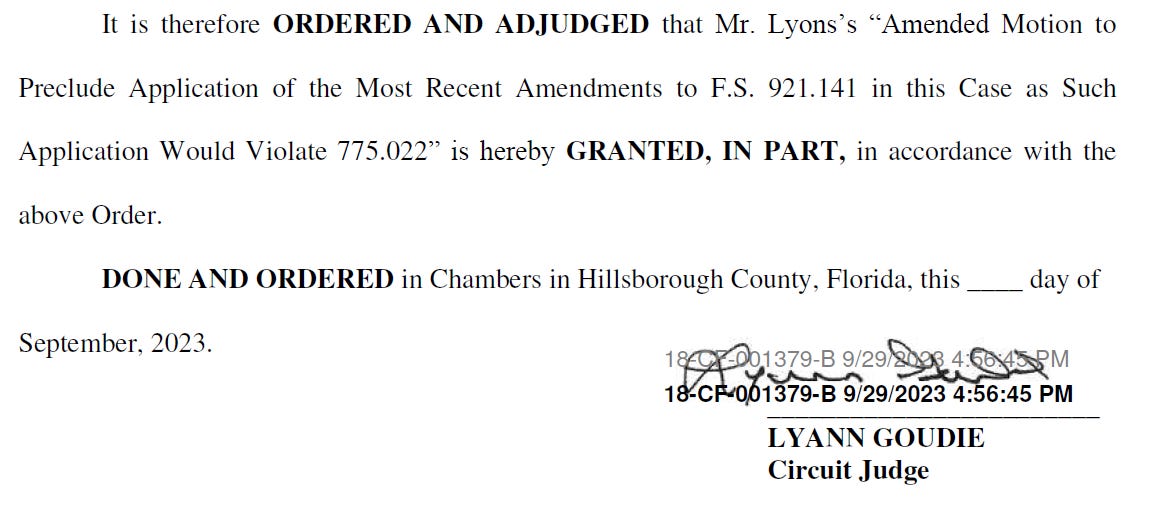Hillsborough County: Applying 8-4 statute would violate Ex Post Facto Clauses.
Late last week, a Hillsborough County judge held that it would violate McKinsie Lyons' rights under the Florida and U.S. Constitutions to apply Florida's new capital sentencing statute to his case.
Last week, a Hillsborough County judge ruled that applying Florida’s 2023 capital sentencing statute would violate McKinsie Lyons’ rights under the Ex Post Facto Clauses of the Florida and U.S. Constitutions.

Lyons is charged with two counts of first-degree felony murder along with other charges for offenses that occurred on January 24, 2018. The State filed its notice of intent to see the death penalty on counts one and two on November 20, 2018. According to the Order, his case “is the first scheduled death penalty trial in th[e] circuit since the amendments” to Florida’s capital sentencing scheme became effective on April 20, 2023. Therefore, the trial court considered the issue one of first impression.
The trial court found “particularly compelling the detailed analysis” set forth in the trial court’s Order in Lobato in Polk County and noted that the Fifth DCA’s decision in Victorino “is not yet final and, therefore, is not binding” on the court. Ultimately, the court agreed with and adopted the trial court’s analysis from Lobato, writing:
Under the new amendments, the State need only convince eight out of the twelve jurors to recommend death. Unquestionably, it is more likely that a death recommendation will be delivered under this new amendment than under the law in effect at the time of the crimes because simple logic tells us that it is easier to convince eight people to recommend death than twelve. Under the new amendments, it is less likely that a jury will recommend a life sentence because now at least five jurors, instead of a single juror, must recommend life in order for a defendant to automatically receive a life sentence. By lowering the bar for the State to obtain a death recommendation from the jury, the amendments to section 921.141 increase the probability that the jury will recommend death and the defendant will thereafter receive a death sentence. This is more than mere speculation. Out of the approximately 150 defendants who previously received death sentences following non-unanimous jury recommendations and were granted resentencings pursuant to Hurst v. State, 202 So. 3d 40 (Fla. 2016), under the unanimity requirement, approximately ninety defendants, or 75%, have been resentenced to life imprisonment.
Based on the foregoing, the Court finds that the amendments at issue here create a significant risk that Mr. Lyons will receive the higher ultimate sentence of death instead of life imprisonment. Accordingly, the Court finds retroactive application of the current version of section 921.141 to the instant case violates the Ex Post Facto Clauses of the United States and Florida Constitutions.
So far, the State has not filed a petition challenging the ruling.
Rulings Across the State
Here’s how trial courts across the state have ruled on this issue and the outcome in each case:
Broward County
Ruled that the 8-4 statute applies to YNW Melly’s case, in which was tried for crimes that occurred in 2019. The trial ended in mistrial and is still being litigated.
Applied the 8-4 statute applies to Clarck Paul’s case, in which he was being tried for crimes that occurred in 2016. More information here. On September 7, the jury recommended that Paul be sentenced to LWOP.
Clay County - Applied 8-4 statute in Othal Wallace’s new trial. The jury did not convict Othal Wallace of first-degree murder.
Duval County
Applied the 8-4 statute to Michael Jackson’s Hurst resentencing proceeding. The jury voted 8-4 to recommend death, and he was resentenced to death.
Applied the 8-4 statute to Tiffany Cole’s Hurst resentencing proceeding. The jury recommended that Cole be sentenced to LWOP.
Applied the 8-4 statute to Johnathan Quiles’ trial. The jury recommended LWOP.
Escambia County - Ruled that the 8-4 statute applies to Leonard Gonzalez’s Hurst resentencing proceeding. Gonzalez filed a petition for writ of prohibition at the Florida Supreme Court seeking relief from the ruling. Dismissal of the petition is pending. More here and here.
Highlands County - Ruled that the 8-4 statute applies to Zephen Xaver’s upcoming trial for crimes that occurred in 2019. More here.
Hillsborough County - Ruled in McKinsie Lyons’ case that applying the 8-4 statute would violate the Ex Post Facto Clauses of the Florida and U.S. Constitutions.
Lake County - Applied the 8-4 statute in Joshua McClellan’s new trial. The jury recommended a sentence of death by a vote of 10-2.
Lee County - Applied the 8-4 statute to Joseph Zieler’s case. He was sentenced to death in late June after a jury recommended death by a vote of 10-2.
Leon County - Ruled that the 8-4 statute applies to Tyrone Cleveland’s new trial.
Marion County - Ruled that the 8-4 statute applies to Renaldo McGirth’s Hurst resentencing. His petition is pending at the Florida Supreme Court.
Miami-Dade - Ruled that the 8-4 statute applies to Robert Horton’s new trial for crimes that occurred in 2013. The trial resulted in a mistrial.
Orange County - Ruled that the 8-4 statute applies to Bessman Okafor’s Hurst resentencing. His petition is pending at the Florida Supreme Court (more below).
Polk County - Ruled in two cases (Lobato and Riley) that applying the 8-4 statute to new cases pending when the statute went into effect violates Ex Post Facto. Petitions are pending at the Sixth DCA (more below).
Volusia County - Ruled that the 8-4 statute did not apply to the Hurst resentencing of Hunter and Victorino. The Fifth DCA granted the State’s petition and directed that the 8-4 statute would apply. The resentencing proceedings are still pending. (More info below.)
Wakulla County - Ruled that the 8-4 statute applies to the Hurst resentencing proceedings of Guerry Hertz and Jason Looney. Hertz and Looney filed petitions for writ of prohibition at the Florida Supreme Court seeking relief from the ruling. Dismissal of the petitions is pending. (More info below.)
Florida Supreme Court Cases
Six petitions have been filed at the Florida Supreme Court by death-row prisoners asking the Court to weigh in on the applicability of the 2023 statute to their pending resentencing proceedings. Here’s the latest in that litigation:
Hertz - The Florida Supreme Court stayed Hertz’s resentencing in Wakulla County pending resolution of his petition. The petition was later dismissed upon agreement by the parties.
Looney - Looney’s petition was filed at the same time as Hertz’s, and his resentencing in Wakulla County is also stayed pending resolution of the petition. The State’s motion to dismiss remains pending.
Gonzalez - After some confusion, the State responded to Gonzalez’s Amended Petition on August 25. Gonzalez’s Reply was filed on September 1.
Smith - The Court denied Smith’s request to stay his resentencing pending the resolution of his petition. The State responded to Smith’s Petition on August 25. Smith filed his Reply September 11.
McGirth - The trial court (Marion County) stayed McGirth’s resentencing pending resolution of his petition. The State filed a Motion to Dismiss the Petition on September 20.
Okafor - Okafor seeks a stay of his resentencing scheduled for early October. The State filed a Motion to Dismiss the Petition on September 20.
NOTE: This list does not include cases in which the defendant has been sentenced to death under the 2023 statute and the case is at the Florida Supreme Court on direct appeal.
DCA Cases
In addition to the cases at the Florida Supreme Court, at least four petitions have been filed in Florida’s intermediate appellate courts. Here’s the latest in that litigation:
Hunter and Victorino - Codefendants Troy Victorino and Jerone Hunter were in the middle of resentencing when Gov. DeSantis signed the new statute. The trial court ordered that the old statute would remain applicable. The State filed a petition in each case in the Fifth District Court of Appeal, which the Fifth DCA granted. A few weeks ago, the Fifth DCA issued a written decision.
Riley - The trial court ruled that applying the new statute violates the Ex Post Facto Clause of both the U.S. and Florida Constitution. The State filed a petition in the Sixth District Court of Appeal asking the Court to require the trial court to apply the new statute.
Lobato - The trial court ruled that applying the new statute violates the Ex Post Facto Clause of both the U.S. and Florida Constitution. The State filed a petition in the Sixth District Court of Appeal asking the Court to require the trial court to apply the new statute.




